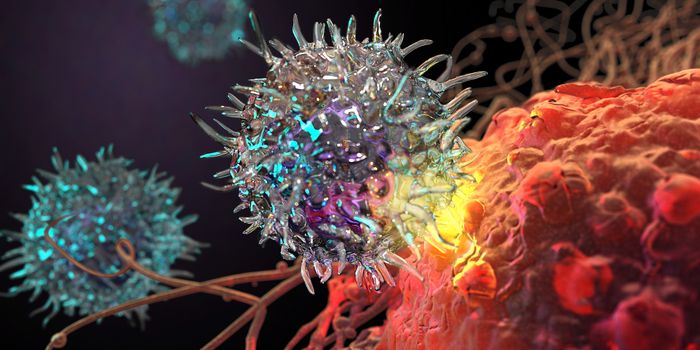A decade-old technology to arm the immune system to fight cancer is now being
adapted to fight HIV, one of the most pernicious viruses in human history. The premise of this immunotherapy rests on chimeric antigen receptor (CAR) T cells that are now mobilized to destroy HIV.

Immunotherapy is a relatively new and attractive line of treatment that stimulates the body’s natural defenses to kill foreign invader cells. Most prominently, this technology has been successfully adapted to target and destroy some cancer types.
In particular, one type of cancer immunotherapy involves the genetically modification of the patient’s immune T-cells to carry a synthetic receptor molecule called a CAR (for chimeric antigen receptor). These specialized CAR-T cells are then able to recognize and destroy cancer cells that have a specific marker, known as CD19.
Because CAR-T cells have been effective at boosting the patient’s own immune system to fight cancer, researchers have wondered whether this technology can be adapted to fight HIV. Indeed, such experiments were carried out in the early 1990s, but were soon halted due to the lack of effectiveness in clinical trials. However, the promise of CAR-T immunotherapy prevailed, and prompted a fresh start by scientists at the UCLA AIDS Institute and Center for AIDS Research.
Fortunately this time, CAR-T cells appear to be a new powerful weapon against HIV. The secret to their success? UCLA researchers had access to new antibodies that were only discovered in the past few years.
Specifically, the team had seven antibodies that were classified as “broadly neutralizing antibodies,” meaning these proteins can bind to many types of viruses. Then, researchers exploited this capability by making CAR-T cells with receptors against a number of HIV strains.
"We took new generation antibodies and engineered them as artificial T-cell receptors, to reprogram killer T cells to kill HIV-infected cells," said Otto Yang, a professor at the School of Medicine at UCLA, and director of vaccine and pathogenesis research at the AIDS Institute and Center for AIDS Research. "Others have used antibodies against cancer antigens to make artificial T-cell receptors against cancer and shown this to be helpful in cancer treatment."
In the lab, this translated to killer T cells that can multiply, and then target HIV-infected cells for destruction. And while the immune system can do this naturally, the onslaught of HIV infection overwhelms the body’s responses. Having CAR-T cells would boost this reaction, such that the immune system can overcome HIV.
While this is the first success of immunotherapy against HIV in 15 years, the research team is proceeding cautiously. "What works in a test tube doesn't necessarily work in a person, so the next step is to find strategies to put these receptors into humans. But this therapy shows enough promise to move forward with further research," said Yang.
Additional sources:
UCLA press release









